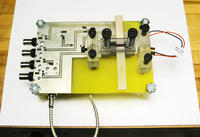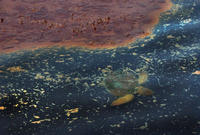-
A 1-kilometer-long electric sail tether brings space sailing closer
The electric sail (ESAIL) produces propulsion power for a spacecraft by utilizing the solar wind; the sail features electrically charged long and thin metal tethers which interact with the solar wind; using ultrasonic welding, researchers have successfully produced a 1-km long ESAIL tether; the produced tether proves that manufacturing full size ESAIL tethers is possible; the theoretically predicted electric sail force will be measured in space during 2013
-
-
Portable X-ray source offers a mobile terrorism prevention tool

The hand-held scanners, or tricorders, of the Star Trek movies and television series are one step closer to reality now that a engineers have invented a compact source of X-rays and other forms of radiation; the radiation source, which is the size of a stick of gum, could be used to create inexpensive and portable X-ray scanners for use by doctors, as well as to fight terrorism and smuggling and aid exploration on this planet and others
-
-
A dandelion-shaped device to help in demining operations
Decades of war have left land mines buried all over the Afghan countryside; they continue to go off, killing and maiming hundreds of innocent people every year; last year alone, more than 812 people were wounded or killed in Afghanistan because of mines left behind after the armies retreated; two Afghan inventors designed a dandelion-like device for demining operations
-
-
"Prophylactic dressing" for walls make buildings safer during earthquakes
In the case of earthquakes, only seconds may remain for a safe escape from buildings; debris falling down and obstructing the escape routes may even aggravate the situation; a new product extends the time for saving lives by reinforcing walls and keeping off the debris; an innovative building material manufacturer now has launched the mature innovation in the market
-
-
Assessing future sea level rise from ice sheets
Future sea level rise due to the melting of the Greenland and Antarctic ice sheets could be substantially larger than estimated in Climate Change 2007, the Fourth Assessment Report of the IPCC, according to new research
-
-
BP settlement includes $350 million funding for Gulf health, environmental protection

As part of the $4 billion settlement announced last month between the federal government and BP concerning the 2010 Deepwater Horizon disaster, the National Academy of Sciences has been asked to establish a new $350 million, 30-year program on human health and environmental protection in the Gulf of Mexico
-
-
Free STEM search engine is now mobile
Gooru — a free search engine for learning that brings together science, technology, engineering, and mathematics (STEM) educational materials on the Web — developed the Gooru Collections iPad app to bring thousands of assorted multimedia resources to teachers and students on the go
-
-
Neuroscience study reveals new link between basic math skills and PSAT math success
New research provides brain imaging evidence that students well-versed in very basic single digit arithmetic (5+2=7 or 7-3=4) are better equipped to score higher on the Preliminary Scholastic Aptitude Test (PSAT), an examination sat by millions of students in the United States each year in preparation for college admission tests
-
-
Smartphones turned into secure and versatile keys
It is already possible to open doors using an app — but we are a long way from seeing widespread acceptance of this in the market; now, researchers have developed a piece of software that will make the technology even more secure and versatile
-
-
Political action the biggest swing factor in meeting climate targets: study
The new study examines the probability of keeping average global temperatures from rising more than 2°C above preindustrial levels under varying levels of climate policy stringency, and thus mitigation costs
-
-
Flexible electronics to make night vision more accurate, easier to use
For soldiers and first responders, having accurate, high-resolution imaging capabilities may mean the difference between success and failure; electrical and computer engineers set out to make night vision more accurate and easier for soldiers, pilots, and first responders to use
-
-
Flexible electronics to make night vision more accurate, easier to use
For soldiers and first responders, having accurate, high-resolution imaging capabilities may mean the difference between success and failure; electrical and computer engineers set out to make night vision more accurate and easier for soldiers, pilots, and first responders to use
-
-
The natural relationship between CO2 concentrations and sea level means that sea level will continue to rise
By comparing reconstructions of atmospheric CO2 concentrations and sea level over the past forty million years, researchers have found that greenhouse gas concentrations similar to the present (almost 400 parts per million) were systematically associated with sea levels at least nine meters above current levels
-
-
Less-lethal 12-gauge shotgun round for law enforcement unveiled
Innovative new round flattens, or “pancakes,” across a subject’s body on impact rather than keeping its shape as other rounds do
-
-
Broader background checks, denial criteria may help prevent mass-shooting catastrophes
Garen Wintemute, a leading authority on gun violence prevention and an emergency medicine physician at the University of California, Davis, believes broader criteria for background checks and denials on gun purchases can help prevent future firearm violence, including mass shooting catastrophes such as those that occurred at Sandy Hook, Aurora, Virginia Tech, and Columbine
-
More headlines
The long view
Encryption Breakthrough Lays Groundwork for Privacy-Preserving AI Models
In an era where data privacy concerns loom large, a new approach in artificial intelligence (AI) could reshape how sensitive information is processed. New AI framework enables secure neural network computation without sacrificing accuracy.
AI-Controlled Fighter Jets May Be Closer Than We Think — and Would Change the Face of Warfare
By Arun Dawson
Could we be on the verge of an era where fighter jets take flight without pilots – and are controlled by artificial intelligence (AI)? US R Adm Michael Donnelly recently said that an upcoming combat jet could be the navy’s last one with a pilot in the cockpit.
The Potential Impact of Seabed Mining on Critical Mineral Supply Chains and Global Geopolitics
The potential emergence of a seabed mining industry has important ramifications for the diversification of critical mineral supply chains, revenues for developing nations with substantial terrestrial mining sectors, and global geopolitics.
AI and the Future of the U.S. Electric Grid
By Doug Irving
Despite its age, the U.S. electric grid remains one of the great workhorses of modern life. Whether it can maintain that performance over the next few years may determine how well the U.S. competes in an AI-driven world.
Using Liquid Air for Grid-Scale Energy Storage
By Nancy W. Stauffer
New research finds liquid air energy storage could be the lowest-cost option for ensuring a continuous power supply on a future grid dominated by carbon-free but intermittent sources of electricity.
Enhanced Geothermal Systems: A Promising Source of Round-the-Clock Energy
By Julie Bobyock and Christina Procopiou
With its capacity to provide 24/7 power, many are warming up to the prospect of geothermal energy. Scientists are currently working to advance human-made reservoirs in Earth’s deep subsurface to stimulate the activity that exists within natural geothermal systems.
